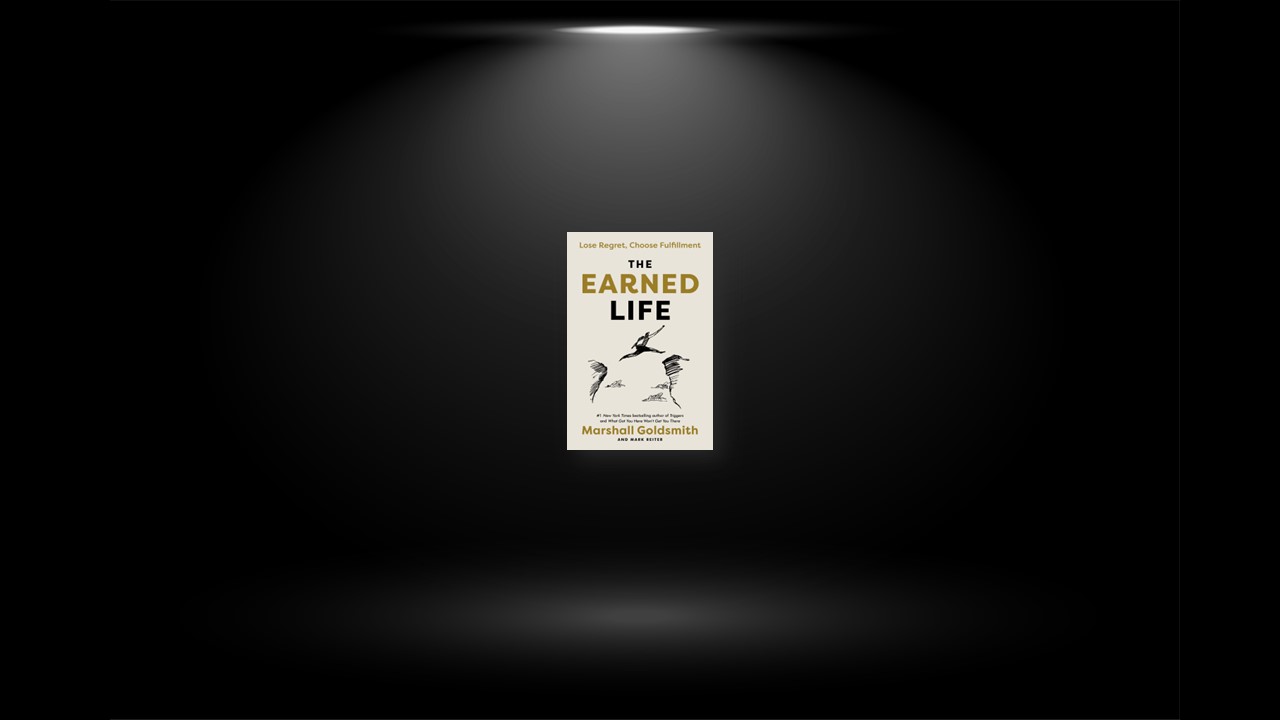The Lost Art of Asking for Help
If the author can leave you with only one piece of advice to increase your probability of creating an earned life, it is this: Ask for help. You need it more than you know.
You would not hesitate to call a doctor if you were in extreme physical pain, or a plumber if your kitchen sink was clogged, or a lawyer if you were in legal trouble. You know how to ask for help. And yet there are moments in each day when asking for help is clearly the better choice and you decline to do so. Beware two situations in particular.
The first is when you are ashamed to seek help because doing so will expose your ignorance or incompetence. The teaching professional at a golf club once told me that fewer than 20 percent of the three hundred members at her club had ever taken a lesson from her. They were too embarrassed by their faulty swing to let her help them. “I pay my bills giving lessons to the thirty or forty best golfers at the club,” she said. “They only want to shoot better scores. They don’t care how they got there or who helped them. Their scorecard doesn’t care either.”
The second situation begins when you tell yourself, “I should be able to do this on my own.” You fall into this trap when the task you’re facing is adjacent to knowledge or a skill you think you already possess. You’re driving through a familiar neighborhood, so you should be able to reach your destination with no need for directions from your phone’s GPS. You’ve given speeches before, so you don’t need a friend’s helping ear to fine-tune a wedding toast or your most important sales presentation of the year.
Before you reject the idea of asking others to help you, consider this: If you are willing to help anyone who asks for your help without thinking ill of them, why would you worry that other people won’t be as generous and forgiving when you’re the one seeking help? The Golden Rule, by definition, works both ways, never more so than when help is on the table.
An even more meaningful question: How have you felt when you have helped others? We can agree that’s one of the great feelings, right? Why would you deprive others of the same feeling?
When Earning Becomes Your Habit
Achieving an earned life is hard work, often all-consuming. But we’re all human. Our resources—energy, motivation, concentration—deplete. When should we step on the accelerator and when do we step back to recover and reboot, balancing the urgency to “always be earning” with our need to reflect on what we’ve accomplished and what remains to be done?
Earning your life is a long game. Check that: It’s the long game. You need a strategy anchored in both self-awareness and situational awareness to sustain the urgency and avoid burnout—until earning has become your habit.
- EARN YOUR BEGINNINGS
In the course of a lifetime, you will experience episodes when one phase of your life ends and another begins. Some of them are predictable markers of modern life: graduation; your first “real” job; marriage; your first house; parenthood; divorce; career success; career failure; the loss of a loved one; a lucky break; a big idea.
- DISENGAGE FROM YOUR PAST
Before you can effectively earn the next phase of your life, you have to disengage from the old phase you claim to have left behind. You not only have to let go of past achievements (you are not the person who earned those achievements), you also have to relinquish your old identity and way of doing things. It’s okay to learn from our past, but the author doesn’t recommend going back to visit every day.
- MASTER THE “EARNING RESPONSE”
If we respond poorly every time to the same stimulus, we shouldn’t be surprised that we get the same disappointing outcome each time. Eventually our poor response becomes predictable; we’ve acquired another poor habit. The only way to eliminate the new habit is to consciously change our response to the unchanging stimulus with better behavior, e.g. instead of “killing the messenger” who brings us bad news, why not remain calm and thank the messenger? Change the response, then change the habit.
- PLAY THE SHOT IN FRONT OF YOU
When golfers play the shot in front of them, they are being supremely rational and disinterested actors, divorced from past or future concerns that may cloud their judgment. They accept that golf, like most of life, is situational, never involving the moment before or after, only now. At their best, they are Buddhist masters of mindfulness and being present.
The enormous value of being present shouldn’t be a controversial idea. And yet failing to “play the shot” is one of our most consistent behavior patterns. We do it all day long—when we ignore our kids at the breakfast table because we’re mentally rehearsing our presentation later in the day; when we’re distracted throughout a meeting because we’re reliving a disturbing call ten minutes earlier; when we typecast people by our memory of their worst moments, refusing to forgive them or accept that people change.
When we fail to play the shot in front of us, we are failing at transition. We are failing to see that something in our world, big or small, has changed irrevocably and we have to deal with the new reality.
Paying the Price and Eating Marshmallows
In creating a great life for yourself, accept the fact that long-term achievement requires short-term sacrifice. But don’t go overboard on delayed gratification. Stop to enjoy the journey. Life is a perpetual marshmallow test, but there’s no medal for accumulating the most uneaten marshmallows. You might as well be hoarding regrets.
Walter Mischel tells a contrasting tale of two brothers. One is a serious and wealthy investment banker with a long, stable marriage and adult children who are doing well. The other brother is a writer living in Greenwich Village who has published five novels that have barely been noticed by the reading public but who “described himself nevertheless as having a great time, spending his days writing and living the bachelor life at night, going from one short-term relationship to the next.” The writer, referencing the Marshmallow Test, speculates that his earnest straight-laced banker brother is capable of waiting forever for his marshmallows, in sharp contrast to the writer, who regards instant gratification as a lifestyle choice.
Surprisingly, Mischel employs the brotherly contrast to give his blessing to the writer’s life, pointing out that the writer must have developed great self-control to make it through creative writing courses in college and then actually produce five novels. Mischel also excuses the writer’s free-spirited dating life, noting that the writer probably needed the same self-control “to maintain his fun relationships while staying uncommitted.”
In other words, the man who invented the Marshmallow Test wants all of us to eat some marshmallows too.
Credibility Must Be Earned Twice
Credibility is a reputational quality earned over time when people trust you and believe what you say.
Earning credibility is a two-step process. The first step is establishing your competence in something that other people value—and doing it well on a consistent basis. This is how you gain other people’s trust. They know you will deliver what you promise. The second step is gaining other people’s recognition and approval for your particular competence. You need both trust and approval to credibly credit yourself with credibility. For example, if you are a saleswoman who tops her quota month after month, people eventually take notice. Continue your unblemished streak for a year or two, and you acquire credibility. Consistent competency creates credibility. Credibility creates influence. It is the earned authority that helps us persuade people to do right, which in turn increases our ability to make a positive difference.
Peter Drucker had five rules that are applicable for earning credibility. If you want to elevate your credibility, start by committing these habits:
- Every decision in the world is made by the person who has the power to make the decision. Make peace with that.
- If we need to influence someone in order to make a positive difference, that person is our customer and we are a salesperson.
- Our customer does not need to buy; we need to sell.
- When we are trying to sell, our personal definition of value is far less important than our customer’s definition of value.
- We should focus on the areas where we can actually make a positive difference. Sell what we can sell and change what we can change. Let go of what we cannot sell or change.
Each of these rules assumes that acquiring recognition and approval is a transactional exercise. Note the frequent reference to selling and customers. The implication is that we must sell our achievements and competence in order to have them recognized and appreciated by others. These Druckerisms not only endorse our need for approval, they emphasize that we can’t afford to be passive about it—not when our credibility is at stake.
After the Victory Lap
There are five recurring themes that summarize the idea of an earned life. Each of these is readily within our control (and there are not that many things in life that we can control).
The first is purpose. Anything we do is more elevated, more exciting, and more connected to who we want to become if we do it with a clearly expressed purpose.
The second is presence. This is the impossible ask—to be present with the people in our lives rather than missing in action. Although we can never achieve the summit of being present at all times, it’s still the mountain we should never stop climbing.
The third is community. Accomplishing something with the help of a chosen community resonates more resoundingly, affects more people, and is often an improvement on the solo act because of the contributions of the many. Would you rather be the soloist or sing with a choir behind you?
The fourth is impermanence. In the grand scheme, we are here on earth for a brief moment. “We are born, we get sick, we die,” said Buddha, as a reminder that nothing lasts, neither our happiness nor a day nor anything else. It is all impermanent. This is not an insight meant to depress us. It’s meant to inspire us to be present and find purpose in each moment.
The fifth is results. This is a negative theme that reveals a positive concept—because the author’s aim here has not been to help you become better at achieving a result. It has been to help you try your best to reach a goal. If you try your best, you have not failed, regardless of the result.
In the end, an earned life doesn’t include a trophy ceremony or permit an extended victory lap. The reward of living an earned life is being engaged in the process of constantly earning such a life.


